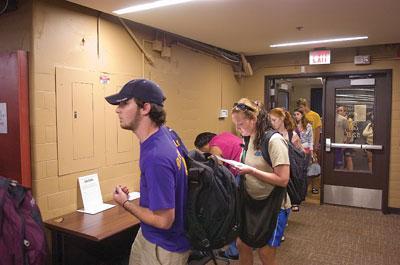Paper isn’t obsolete — yet. If that comment seems self-serving in a newspaper, it probably is. That said, the advent of the information age is gradually narrowing the uses for paper. Nowhere is this truer than in academia.In the old days, students learned by the sweat of their brow — and a staggeringly huge amount of paper. Now, as computer and information technology continues its manic pace up the mountain of progress, universities are finding innovative ways to operate without a “hard copy” of information.A myriad of sources — including, despite what some professors tell you, legitimate scholarly works by experts — can be found on the Internet. Assignments and syllabi can be transmitted electronically, obviating the need for professors to distribute colossal stacks of paper to their assorted students. Tests can be administered at computer centers, saving time, effort and paper. Exams are instantly and automatically graded, so students immediately know how well they did, and professors don’t have to waste time sifting through mile-high stacks of completed materials.Paperless resources just make sense. They save time and money for students and faculty. And they save the planet — although it’s true electronic resources (especially the Computer-Based Testing Center) do consume huge amounts of energy, it’s less than the energy and raw materials required to produce paper.While professors are turning more and more to paperless communication, electronic resources can improve the way we learn while being economical. Such measures are simple and effective, yet they are not nearly being universally employed.Recording video of lectures, for example, could prove extremely beneficial. While some professors complain posting video of their lectures provides an incentive not to attend class, ways exist to avoid that pitfall. It would likely not be difficult for professors to block access to videos for only those with specific permissions. If a student misses class because of illness — such as swine flu — the professor could grant access to recordings of those lectures missed. That way, students can receive the information they missed and return to class with little catch-up work dragging them down. It’s true there’s no substitute for actually being in class, but sometimes attendance just isn’t possible.Another example: aside from occasional glitches, Moodle — the University’s online venue of communication between professors and students — provides an amazing opportunity for assisting students in assimilating information. Assignments and syllabi can easily be transmitted via Moodle. Not only does this save paper, but it provides an easily accessible and constantly available copy of any information students need to complete their coursework. Grades can be posted so students are aware of their standing in the course and what they need to do to improve. The most technologically savvy professors can even administer quizzes and accept assignments over Moodle, which, again, saves paper and provides instant results.In other words, this resource provides too many advantages to be ignored. Unfortunately, some professors still do just that.The chief professorial complaint with Moodle is “it’s hard to use.” This is probably true. But learning how to use any new technology is necessarily going to involve a learning curve, and expecting professors to attempt it isn’t unreasonable. Teachers probably looked at the printing press and said “it’s too hard to use,” — anyone with a student job has seen some instructor sitting at a simple copy machine saying the same thing. Besides, the University offers training sessions in using Moodle — and the thought of professors too lazy to attend a class is, to put it lightly, ironic.The unwillingness of instructors to put in the time or effort to learn more about technological means of better teaching is reprehensible. At least a minimal participation in Moodle should be a requirement for every class taught at the University.Paper may not be obsolete yet, but that doesn’t mean we shouldn’t be trying to maximize learning simply because we’re too change-resistant to reduce the use of it.
Matthew Albright is a 20-year-old mass communication junior from Baton Rouge. Follow him on Twitter @TDR_malbright. ————Contact Matthew Albright at [email protected]
Nietzsche is Dead: Professors should capitalize on paperless resources
September 23, 2009







